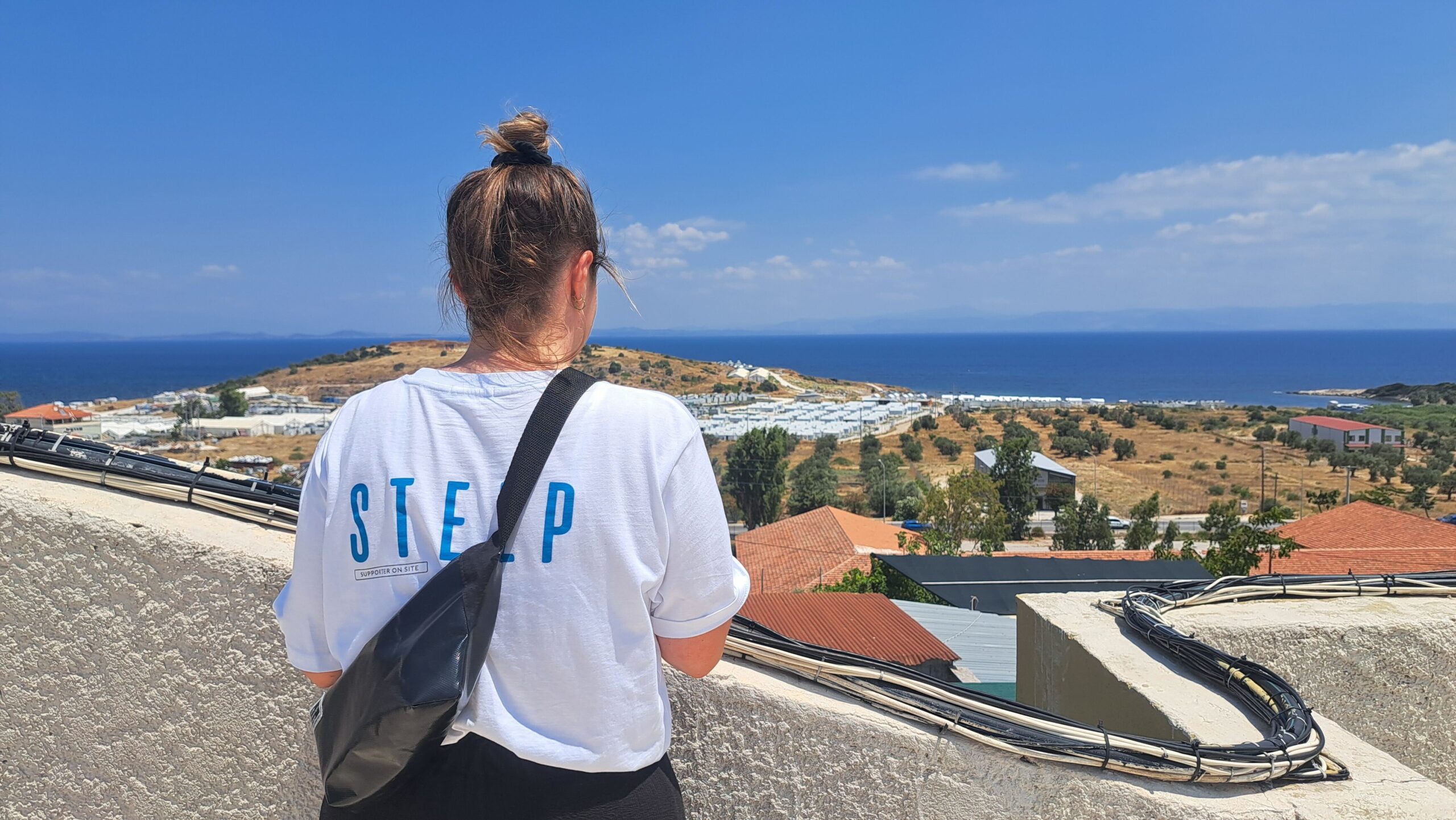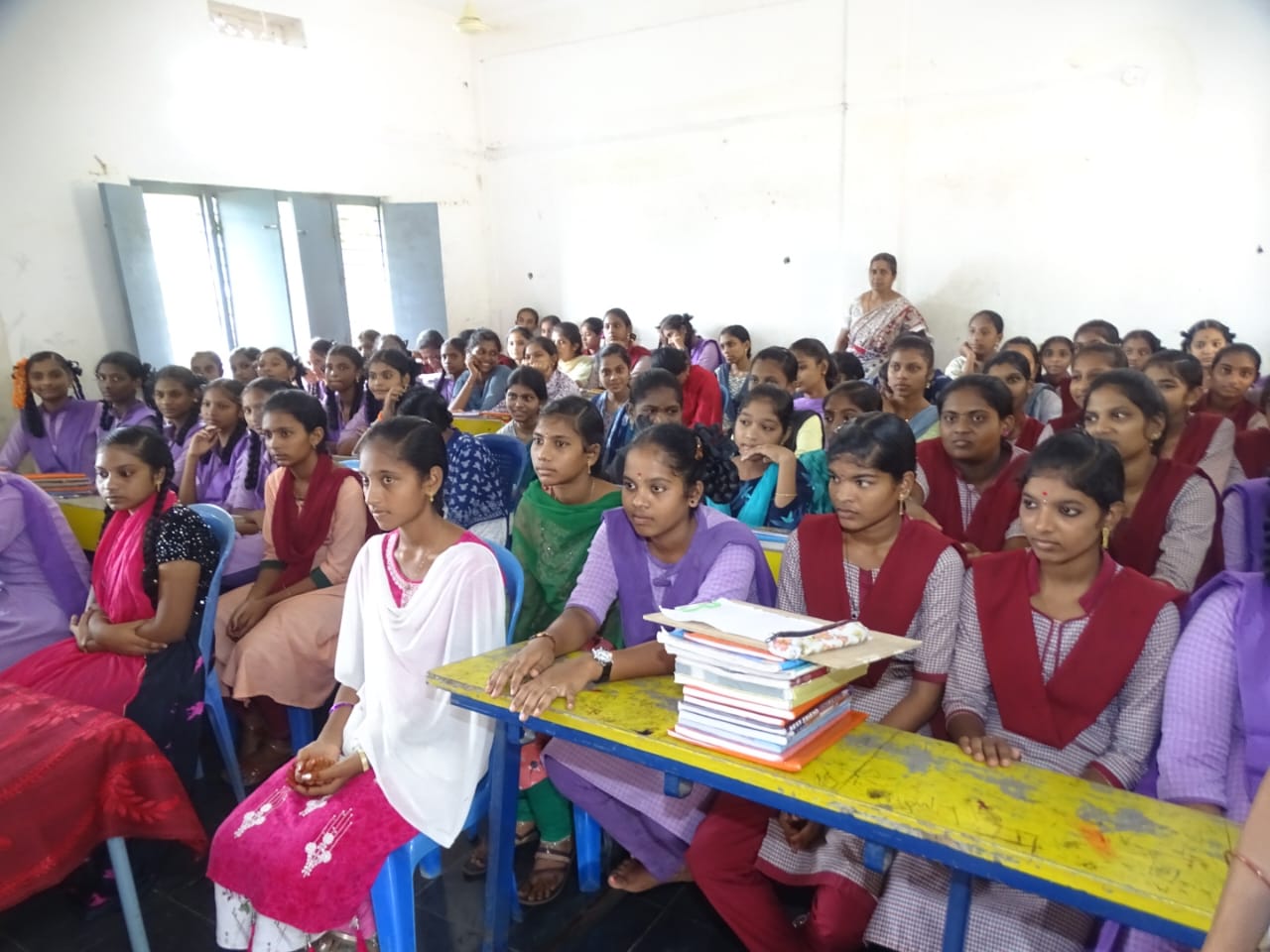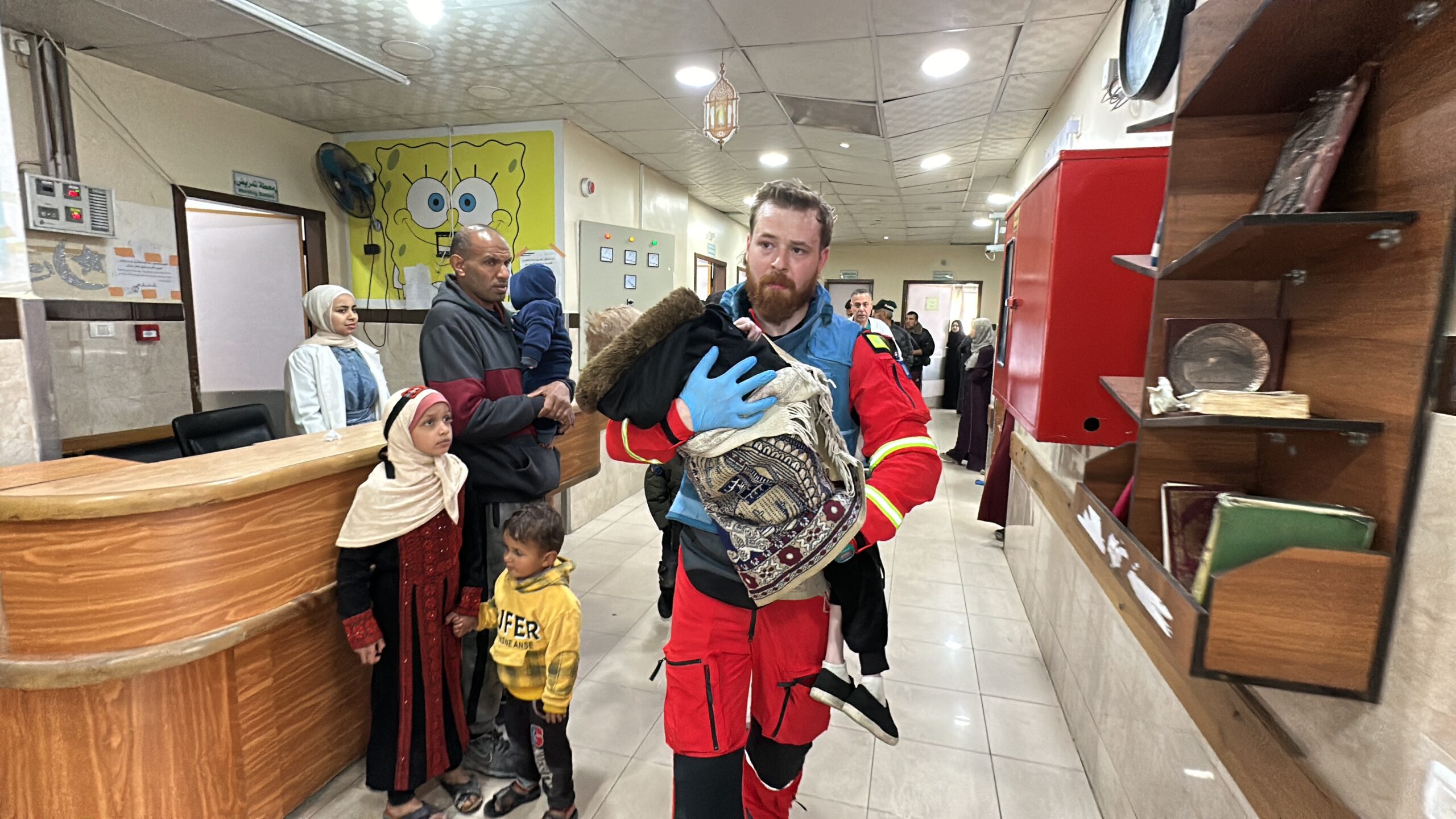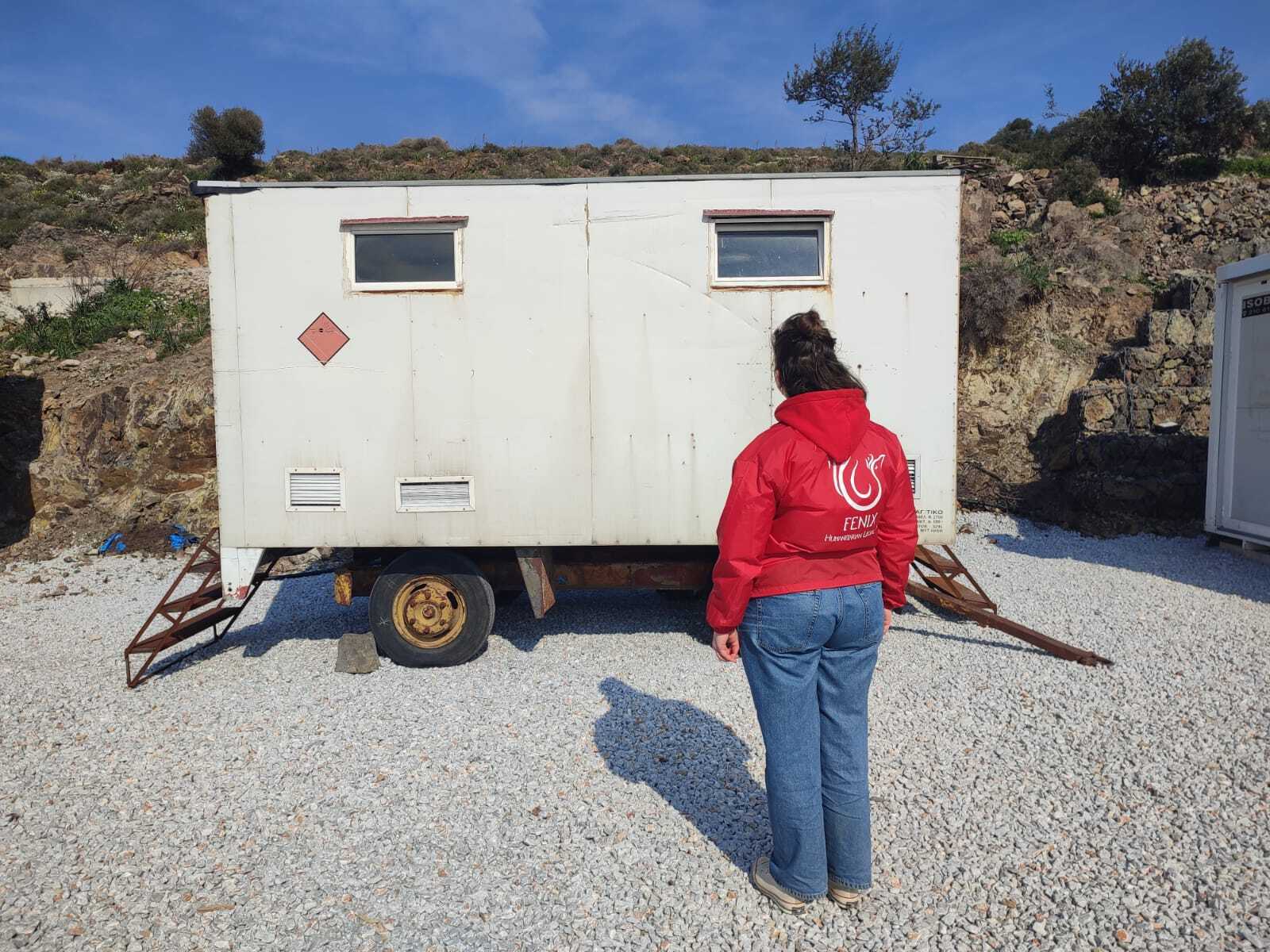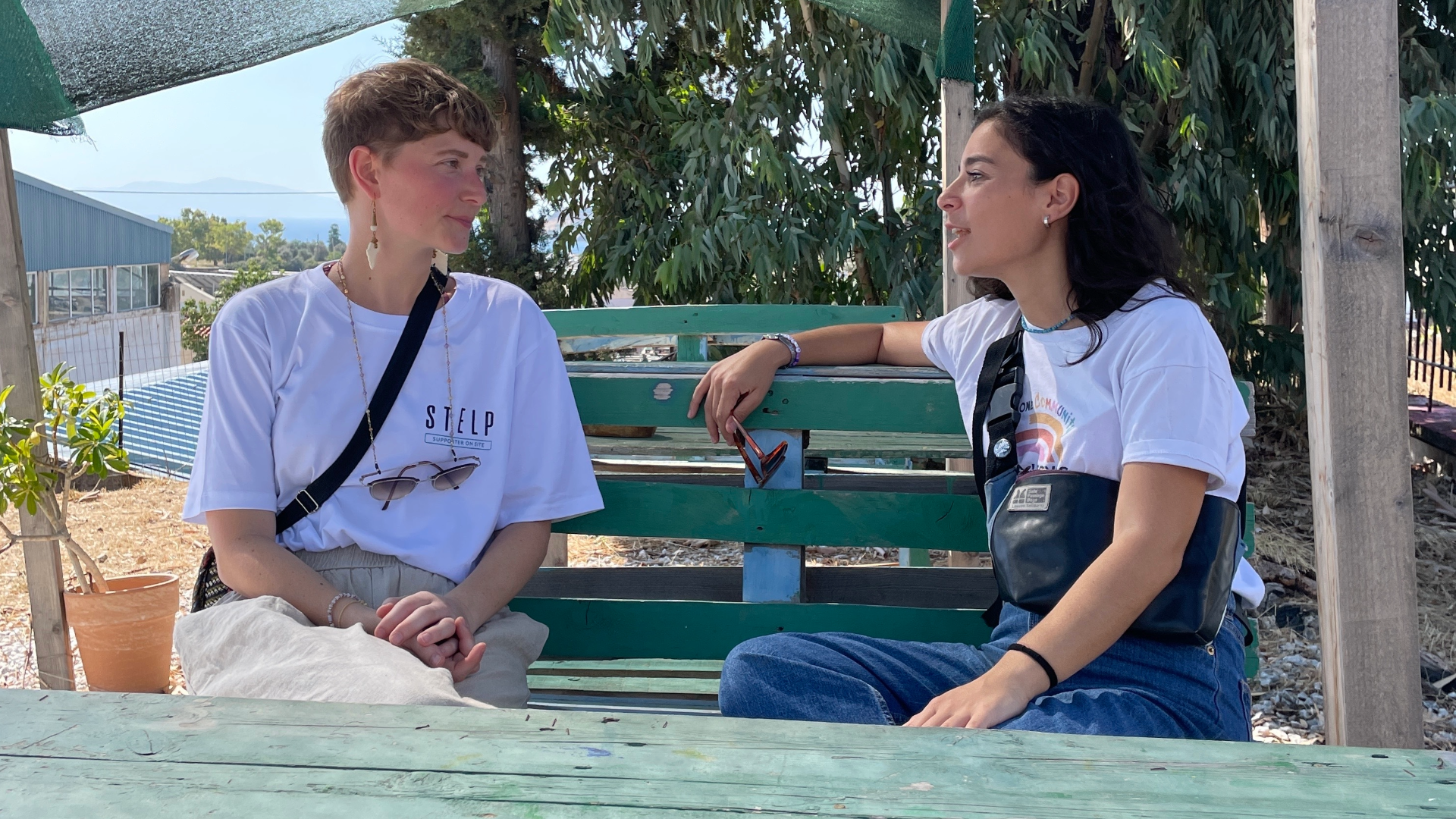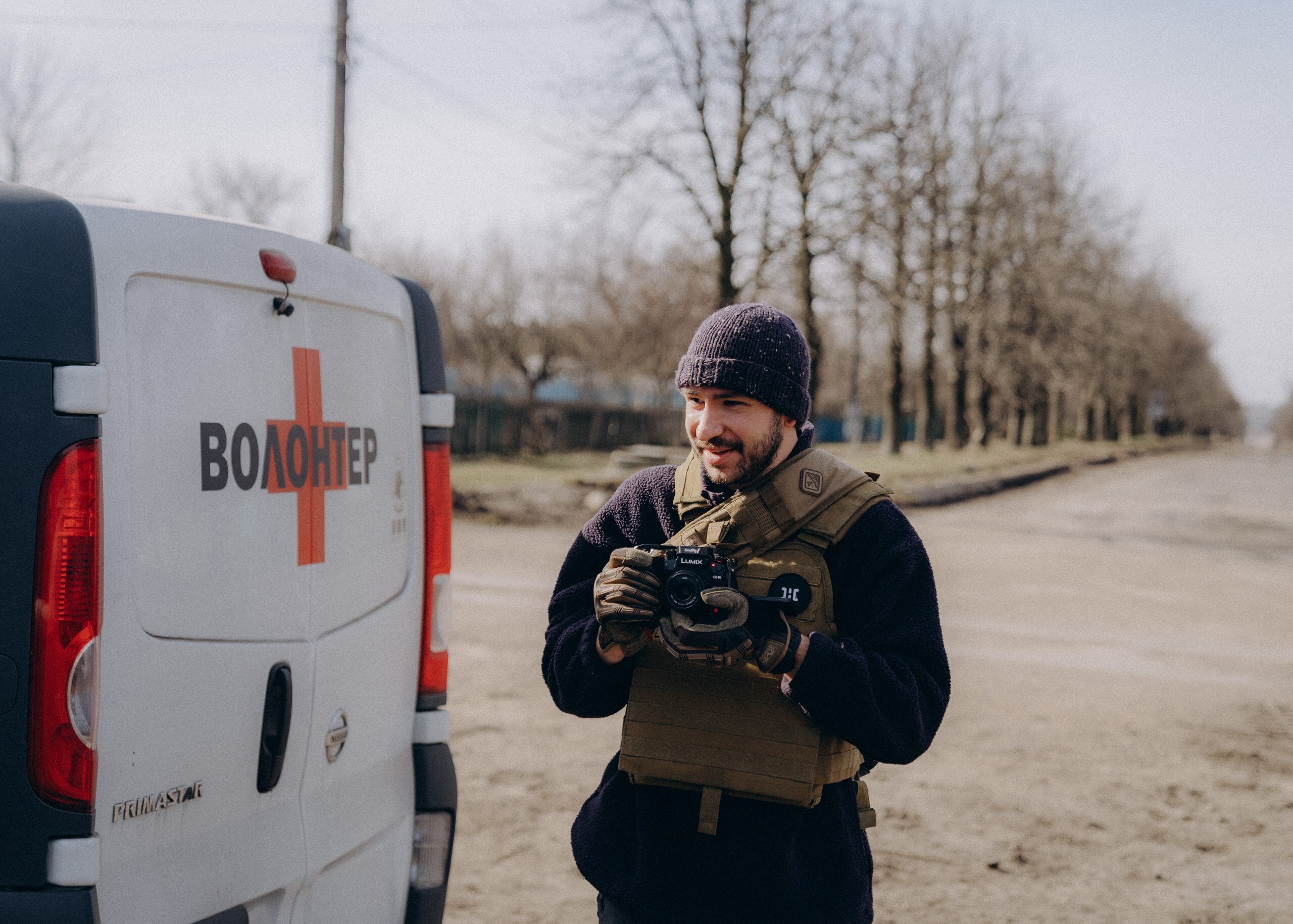Part 6 of 8 from the series by Christina Lopinski
“Try 32,” Nick calls out as he wipes sweat from his brow. I slip the rainbow-colored rubber boot off the girl’s foot. She shakes her head. “Too small,” I say, more to myself than to her, and put the pair back in the plastic bag, which goes back into the giant size 31 rubber boot box. The girl is pushed, and the line behind her grows longer. We must be faster than impatience, all the children are waiting for dry feet. It’s hot today. Only the huge puddles and muddy sandals suggest yesterday’s rain. We’re glad the weather is good today, otherwise it would be impossible to reach some of the camps to distribute rubber boots.
Countless colorful pairs, sizes 25 to 40 are stowed in boxes. Babies and toddlers get non-slip socks. “It’s different than usual, distributing shoes is complicated,” Nina says this morning. We all sit together at breakfast and eat simit. Ali has brought waterproof markers and is holding foot gauges. “Two people measure the children’s feet. You write the size on your right hand. Two people find the shoes that fit. Cross out the number if the kids got shoes. It’s going to be a big mess.” He looks around the room, looking each of us in the eye. Can I count on you guys? We nod without him asking anything.
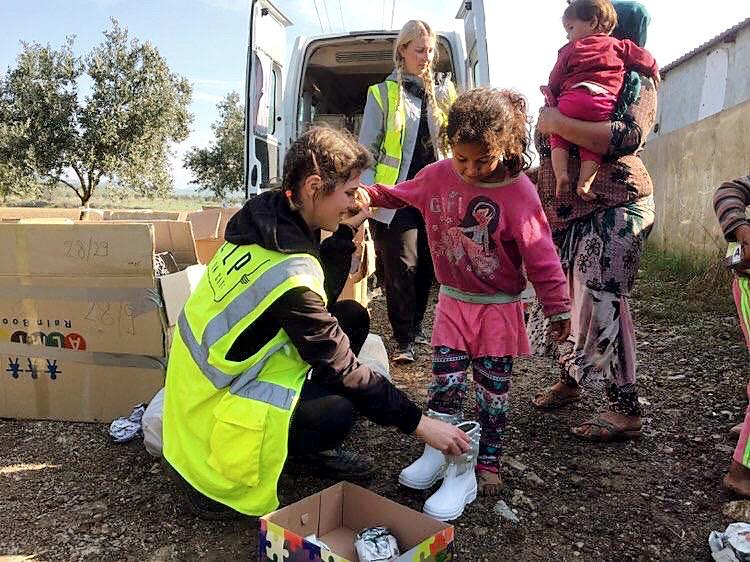
Chaos has taken on a new face here, the mess I know from home now feels orderly because my world is orderly. Here, order is a foreign word, just like a roof over one’s head or weatherproof clothing. Or human dignity. Although I’ve been to the tent cities several times now, handing out food bags and diapers, hygiene items and heating stoves, I’m shocked anew each time by the conditions. Everything is the same as five weeks ago, I see the same children with the same clothes, with the same dirt mixed with new, everything is the same, but a little worse, because I understand that this extreme situation is everyday life. If this lack of perspective were a color, black would still be too light.
“Chaos has taken on a new face here.”
The others have already gotten out of the car, while I silently look out the window. Pity brings the least, I remind myself. We hand out rubber boots, I remember. We bring warm feet. Nina grins at me and waves. She has a little girl in her arms, laughing heartily. When we have nothing, we have memories. We can be a nice memory to the kids, I think as I hop out of the car. Nina is already sitting on the floor measuring her feet. Valentin and Nick are unloading the car. More and more people are coming out of their tents, everyone is excited. “They have to line up,” Nina says to me, looking at me pleadingly. She has countless children’s feet on her face, small and dirty, they all want shoes, now, maybe there won’t be any left in a minute. Mothers push their way to the front, stretching their babies out to us. I understand the mothers and it breaks my heart to send the pained faces to the end of the row, most of them I have to accompany, I have to push the women to the end of the row and carry the children because people have learned that pushing means getting full and standing at the back means freezing.
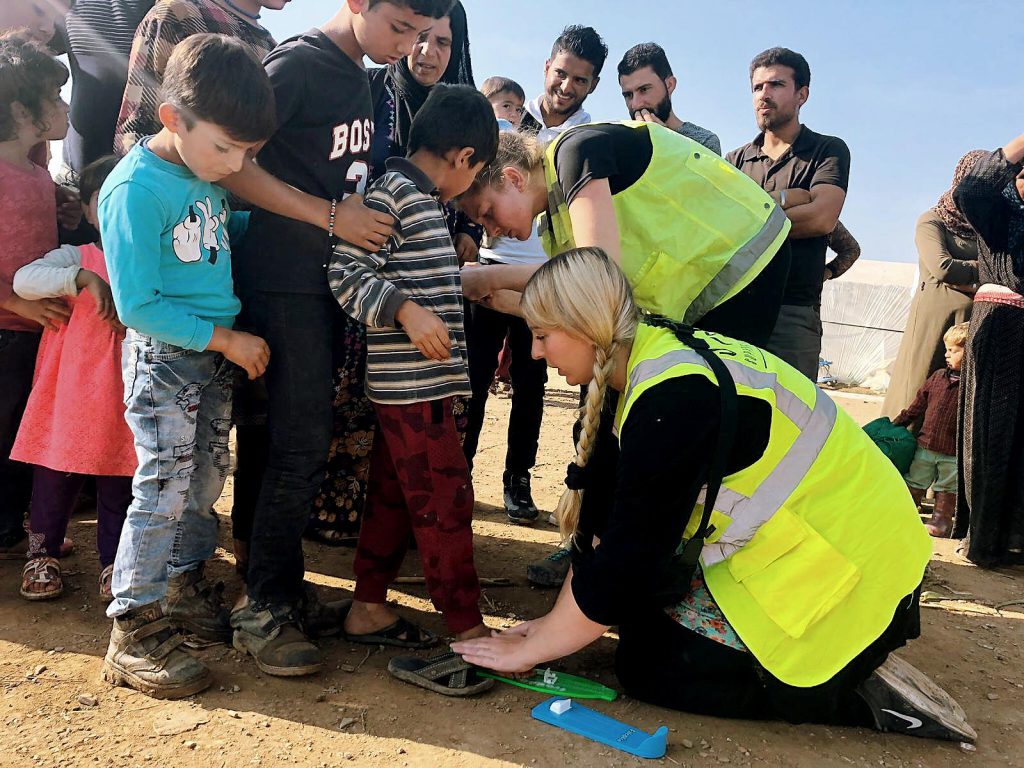
I help Nina measure. Most kids have a hard time stretching out their toes and putting their foot flat on the plastic template. Children are used to bending their big toe, which helps against cold or shoes that are too small. Nina writes numbers on children’s hands, Valentin, Nick and I look for the matching rubber boots. We help the children into the shoes, some shriek with excitement, others cry, one girl, size 30, is so happy that she falls around my neck and doesn’t take the shoes off again until we drive away. She’s probably wearing them at this moment, my little size 30.
The distribution of the rubber boots works out much better than expected. Only a few children line up twice. Now I understand the purpose of the waterproof markers. A little boy with very big feet pulls at my T-shirt hem. “Abla,” he says. Big sister. He holds the back of his hand in front of my face, a black 42. “Shit,” I say, instinctively wanting to stomp my foot on the ground, shit, shit, shit. Our rubber boots stop at number 40. And what do kids with bigger feet do? Freeze? Or are you no longer a child after size 40? The boy looks at me with big eyes and laughs, I see his joyful excitement, all the other children are already playing with their new shoes as if they were toys. I take the boy by the hand, he is 12 at the most. “We’ll try this with 40,” I say in German to convince myself that it will fit somehow. We can’t even get the ball of our foot in. He pushes, I pull, he shakes his head, tilts it, points to the other boxes. I am overwhelmed and have to live out injustice that I have no control over. How do you explain to a child that his feet are too big to get shoes? You’re different, that’s why you don’t get shoes. I don’t want to convey that, my heart breaks at that moment. Life is so, so unfair. Meanwhile, his father is standing next to him. I explain the problem pantomimically, a torrent of Arabic anger overtakes me at the same time as feelings of guilt. I am so, so sorry, I say. The boy cries. Valentin and Nick pack the boxes into the car, the mood in the camps changes quickly. People get restless as we pack up. Our boxes are opened carefully, parents pull children forward. ‘We haven’t gotten anything yet, we have another sick child in the tent, we need another pair, no two, please, please, abla, abla.’ Women point to their bare feet, mothers who are still children themselves ask for shoes. Are you no longer a child when you’re a mom? Size 38 is out, there are two more camps waiting for us today and three tomorrow. And then there are all the bare children’s feet waiting for us too, without us knowing it. There are enough rubber boots for everyone, they just need to be distributed fairly. Justice knows no subjunctive. We are dirty and exhausted when we close the van doors, we don’t talk because the incomprehensible fills the space. It’s the same thing every time. And yet I’ll never be able to get used to it.
“I have to live out injustice that I have no control over.”
As I write this I’m sitting on my bed in the container, a fan heater is in front of me, I’m full and I’m not cold, I’m fine. I want to tell about today because it is important and incomprehensible. It’s hard for me, I had to blink away my tears several times today. In our little village where I live, we have new guests since yesterday. Or residents. Or family members. We took them from one of the camps we took care of yesterday because the children need special support and the mothers need relief and protection. There are seven more of us now: two moms, one baby, one toddler, Elif and Hamsa, both 5 years old, Rama, 13. It’s stressful to have to choose four children with the knowledge of leaving hundreds of others behind, in the most disastrous conditions. It’s even more stressful to witness a fate like the one our new children have. Elif, Hamsa and Rama are disabled. There is no superlative of fate severity. But escape and disability is probably the most terrible of all ideas. The three children would need very special care and support, they would need physiotherapy and school lessons. The three need medical care. Above all, like thousands of others, they need running water and regular food.
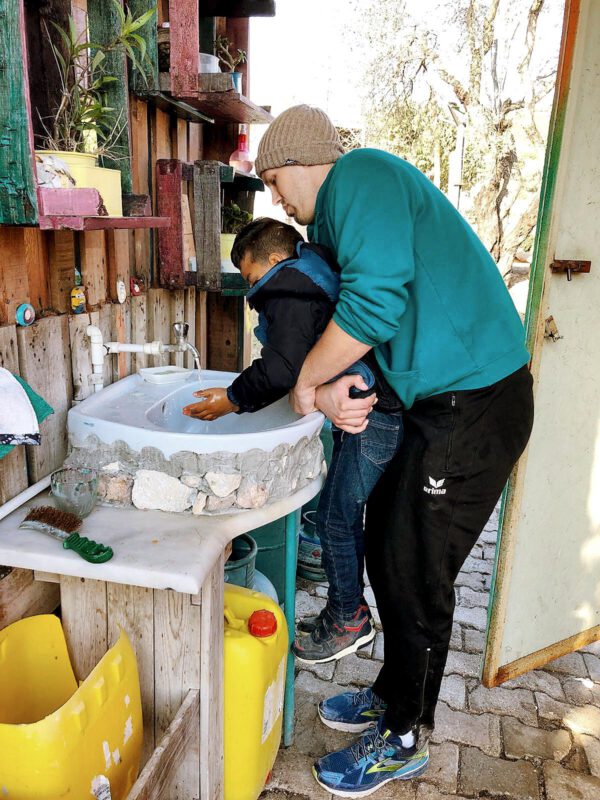
As the people climb into the van with nothing but two plastic bags, everything they own, we are overwhelmed. We are continuously in a position where we need to radiate protective security. We must not allow fear, overwhelm, disgust or frustration. None of us are social workers, Nina is a teacher, Valentin is a doctor. None of us are trained to care for disabled children around the clock. The babies are squinting. It’s not clear if they have a disability, too, like their siblings. “We’ll see,” Ali says. Elif, Hamsa and Rama can’t walk. Rama has crutches that are way too big for her; the two little ones have walkers that look like walkers. The children are neglected. The car smells like a cocktail of feces and filth. I’m ashamed to write this, but I’m afraid to touch. I know that scabies is rampant in many of the camps. Almost everyone has lice and fleas – how to protect against that too? I’m afraid of anything that crawls. Today I felt how it feels to overcome fears so that they are temporarily hidden.
It’s Tuesday, 09:00. We sit at a huge table of tables and eat breakfast together. I’m feeding Elif. It takes time for her to eat anything at all. Then she doesn’t stop at all. She scoops up yogurt and jam and apple slices and tomatoes and cucumber slices and white bread. The baby cries and vomits, we get toilet paper. “He’s gonna be sick,” says Cangül, sitting next to Hamsa, who is taking the leftovers from the other plates. He’s about to eat the plate, I think. The kids don’t seem to have a sense of satiety. Hamsa’s mouth is smeared, he has yogurt in his hair, and an indefinable liquid on his shirt. Why are you wearing a shirt, little man? Because it was what was just there. Rama has to go to the bathroom. I’ll give her the crutches. Do you want me to go with her? We all don’t know, so I’ll go along. Do you want me to come in with you? She doesn’t understand me and nods no matter what you say. So we go to the bathroom together. Rama is 13, I don’t want her to be ashamed of me, but we all don’t know if she’s ever used a toilet. I show her how to sit on it. She nods and I am relieved that everything is working out. I show her how to wash her hands. She smells the soap. She smiles, I smile, we’re a team now. Hamsa has stopped eating. I hope he doesn’t break out all over again. “Are we going to school?” Cangül looks at us.
“We’re a team now.”
Our school is a small room with a few tables and a blackboard, with pens and toys. We don’t know what mental level the children are at, all we know is that they don’t have any schooling. Rama should be in the sixth grade. Rama can neither read nor write. I carry Elif up the stairs, Valentin helps Hamsa walk. Then something happens that touches me very much. Before school we all take off our dirty shoes. The others are already inside, Hamsa is the last. He lunges on all fours, sticking his butt in the air like a dog. He has learned to move without being able to move. Physical limitations make creative when external circumstances do not allow treatment. I want to stop Hamsa, afraid he’ll lose control of his body from all the colorful toys and dash off. Before I can yell stop, the little boy’s hand pulls on the Velcro of his shoe. On all fours, the boy manages to take off his shoes and put them in front of the door, only then does he clamber into the room. He struts more than he crawls. Hamsa moves gracefully, Hamsa is a fighter. Cangül and I look at each other, we mustn’t cry now, the children need us.
The morning is exhausting and grueling. I’ve rarely been so mentally exhausted, I feel like I haven’t slept in days. The kids are overwhelmed, with all the toys. They pick up dolls and stuffed animals in their hands and mouths, crayons and cars, rattles and balls. We sit in a circle and throw a ball at each other, saying our names as we go, trying to get the kids to talk. Rama is the first to say her name. When Elif mumbles something that sounds like her name, we clap our hands, now we’re all excited. We can watch the children learning. When Elif says ‘Chrissi’, my heart breaks for the second time that day. She laughs at me with her black baby teeth. She laughs so heartily that I laugh along, Hamsa laughs too, and Rama and Valentin and Nick and Nina, and for that moment the world is somehow all right. Then Elif wets her pants. Yusuf cries. We all take a deep breath, but not too deep, the school smells like kids who haven’t gotten enough attention and love in a long time.
“The next few weeks will be tough,” Nina says after dinner. Jana nods as she places a cardboard on her chair. Hamsa peed on the chair earlier. The children are not used to drinking and eating so much, they can’t articulate that they need to go to the bathroom, they probably don’t feel it until they are sitting in their urine. We put diapers on all the kids. A state of emergency started for us yesterday. We are needed around the clock now, with everything. The children are traumatized and come from a different reality. A reality where there are no toothbrushes and no soap, no toys and no future. We are now all at once. Teacher and physical therapist, big sister and counselor, cleaner and friend. I remember my first days in Turkey. How sorry I felt for Yasmin and Mutea, Rashid and Sheia and Yusuf, who ‘have’ to live here permanently. The having to has turned into being allowed to, knowing how many people there are who are so much worse off. Yasmin and Mutea go to school, grow up as children should, can read and write, and survive in the world we call ‘ours’. Yasmin helps translate, she speaks Arabic and Turkish. She can communicate with Rama and through her Rama can communicate with us. Yasmin is 9 years old, Yasmin is from Syria. Yasmin was given a future, Rama was not.
By now the sun has set, I’m still sitting in my container, hearing people walking by, container doors slamming. I feel safe here. I wish the women felt safe too. All people deserve to have a safe zone. I’m so angry, at the situation. I am so angry that a few produce the suffering of many without ever feeling any of it. Greed for power destroys so much more than political relationships. I think of Kosta from Greece. “The situation is getting worse.” He said that last week. I wonder to what degree bad can be increased. Hasib writes when I’m coming to Chios. He tells of new boats, every day. I miss you, he writes. We all miss someone who catches us while we catch what is actually already on the ground.
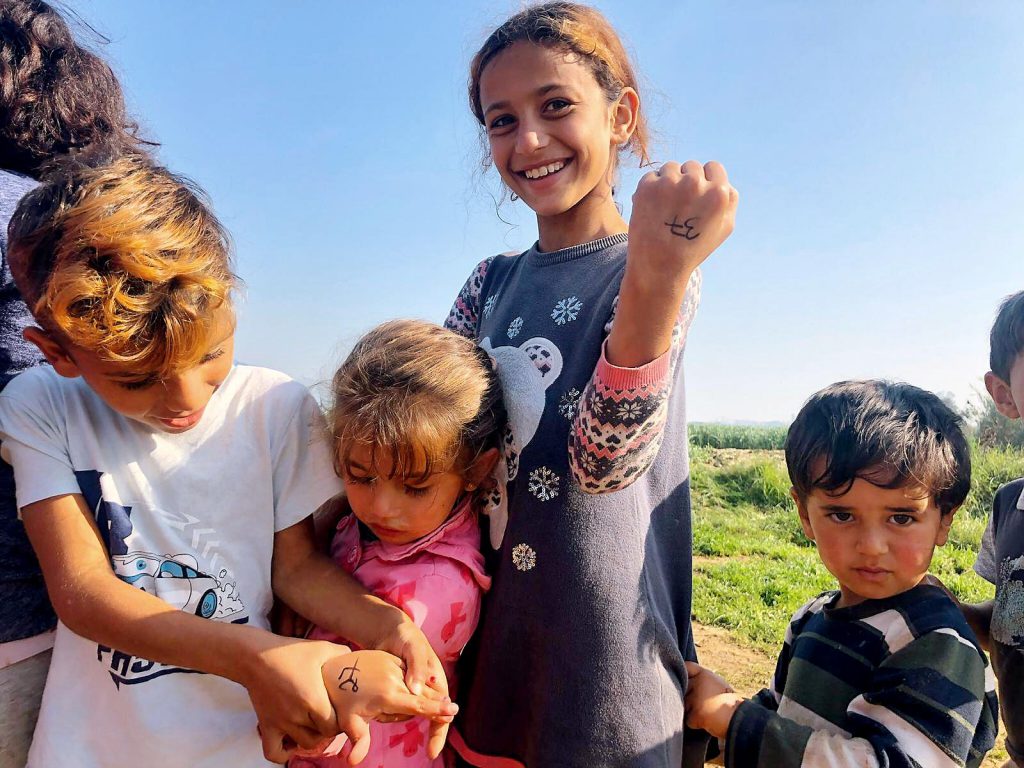
About the author:
Christina Lopinski was a volunteer for STELP in the IMECE village in Cesme/Turkey from October to December 2019. The 24-year-old has lived in Berlin for a long time and during that time wrote for the Berliner Abendblatt, the B.Z. and the Wiesbadener Kurier. She currently works for the Frankfurter Allgemeine Zeitung.

